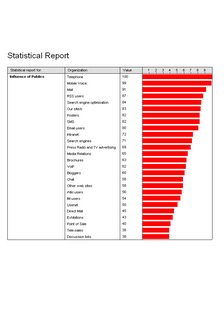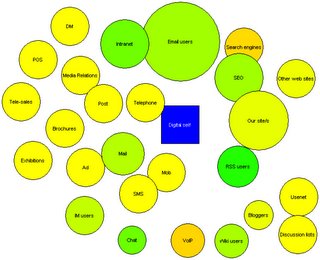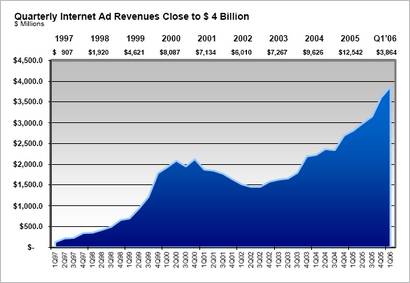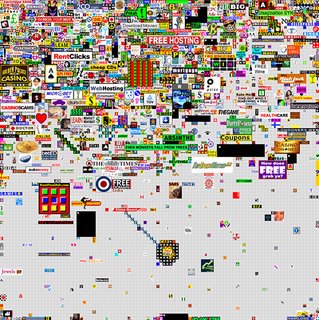 For a long time I have been looking at the relationship value model and I want to explore the concept of values we use in interactions as the coinage of social currency.
For a long time I have been looking at the relationship value model and I want to explore the concept of values we use in interactions as the coinage of social currency. In examining the significance of relationship in the Relationship Management domain of Public Relations, the theory goes that organisations are not monoliths but the nexus of relationships which merge morph and change from day to day and hour to hour.
These internal relationship are not really internal, it is just that that is where the focus, the nexus, is.
The key is in relationships and these are created and formed when people find values in common and which tickles the deeply embedded motivations that make us human, the Deo Optimo Maximo among social animals. We are genetically programmed to form social groups.
It is worth going back a long way to see what the thinkers had to say in their time and if the realty matched the ruminations.
In 2001, author and broadcaster Douglas Rushkoff explained the currency of values with the expression Social Currency which he explained like this:
When my father was growing up, bubblegum companies competed by offering free trading cards inside their packages. Little pieces cardboard with the images of baseball players proved the most successful, and soon children were buying whole packs of baseball cards with only a single stick of bubble gum. Today, baseball cards are sold without any bubblegum at all.
More importantly, this depth of data allows the card to serve as what I've started to call "social currency." While children can debate the merits of one brand of gum over another for only so long, they can talk endlessly about the players' whose cards they've collected, trade them, or even just peruse one another's collections. See, the cards aren't really ends in themselves; they are the basis for human interaction. Johnny got some new cards, so the other kids come over to see them after school. The cards are social currency.
We think of a medium as the thing that delivers content. But the delivered content is a medium in itself. Content is just a medium for interaction between people. The many forms of content we collect and experience online, I'd argue, are really just forms of ammunition -- something to have when the conversation goes quiet at work the next day.
Content on the Web is no different. Sure, the Internet allows people to post their own content or make their own web sites. But what do most people really do with this opportunity? They share the social currency they have collected through their lives, in the form of Brittney Spears fan sites or collections of illegally gathered MP3's of popular songs. The myth of the Internet -- and one I believed for a long time -- is that most people really want to share the stories of their own lives. The fact that "content is king" proves that they don't. They need images, stories, ideas, and sounds through which they can relate to one another. The only difference between the Internet and its media predecessors is that the user can collect and share social currency in the same environment.
Dynamic and successful people and organisations can make things happen
Nancy Dailey, Ph.D. and Kelly O'Brien offer us further insights
People who can make things happen have one thing in common-social currency. Imperceptible, yet powerful all the same, social currency is like business accounting for goodwill. It's the intangible value earned from the exchange of positive human interactions. Helpful relationships produce social currency. Regardless of your position in the social space at work, your social currency can wield influence and power to make change happen.
So what is social currency? It's the new power tool for today's work world. Technology is pushing interdependence in our organizations faster than we can adapt. People need to mirror the technology: fast, focused, integrated, and web-like in their interactions with co-workers, clients, and vendors. People with social currency can move faster and be more effective because they have established trusted relationships. It1s these relationships that move others to change, to try new things, to explore possibilities.
Here's how it works-The more helpful relationships are, the more information is shared. The more information is shared, the more people feel connected. The more people feel connected, the more they trust the relationship. The more trust people feel, the faster the acceptance of change. That's why this notion of "social currency" is replacing information as a key power driver of change.
Having information by itself is no longer the same as having power. Just think of the number of emails you receive each day (and don't read). Distribution of information in organizations today, at least technically, is fast, focused and integrated. What is missing in organizations is the mechanism to make sense of all the information and for the information to make any difference. Information alone means very little. It's what people do with or about it that matters. That's where social currency comes in -- it attends to the ‘people side' of the equation -- where information gets transformed into knowledge, skill, and action.
Nancy has a number of interesting papers on her site which add to this thinking.
Social Media and Social Currency
In this contribution, they begin to introduce the idea that out modern technologies have a role to play. Perhaps we can explore this a little further with John Clippinger at the Commons Blog who puts some of these currency and values ideas into an Internet context. He sees some values as tags and I paraphrase:
Reputation systems are an especially important aspect of social cooperation because they are attached to an individual and form the basis for whether they can be trusted and accepted. A reputation is really the collection of tags that are assigned to an individual or entity to reflect assessments of their competence or status within a specific social network. Given that individuals play different roles in social networks - they can serve variously as connectors, gatekeepers, truth-tellers and enforcers - reputations are tied to roles within social networks.
It is not difficult to see how important reputation tags are in small traditional societies where once a reputation is acquired, it may be very difficult to change. Honor-based societies depend upon reputation tags as the principal governance mechanism for defining and enforcing a social order. "Honor killings" of a daughter or sister in order to preserve a familiar reputation suggest the power of reputation in Human Nature. Even in online communities, reputation tags are the motivator and governor of behaviors. People take seriously the reputation scores of an eBay seller/buyer, the accumulated scores of a player of online games, or the number of friends and ratings one has in the online social networks of Linkedin, Orkut, Friendster, Facebook, or My Space.
Reputation tags affect an individual or group's ability to participate within and across different networks, thereby becoming the basis for granting/revoking certain privilege and decision rights. Since reputation tags can be measures of competence by a socially credible third party - e.g., religious, educational, financial, political, trade or professional institutions - they play a very powerful role in governing social mobility and enabling/thwarting interactions between different social networks. By providing information about information - who or what it is, where it came from, as well as marking the rights and privileges for accessing, exchanging, altering, or forwarding goods, services and information, tags are the true control points in self-organizing networks.
A social currency is the reputation score an individual or entity acquires in a particular social network that credibly reflects their value in that network. For example, like a monetary currency, the value of a social currency may be set by the demand that an individual in a given social network can command, as in some kind of supply and demand calculation. Yet the calculation may also reflect a more subtle calculation of value based upon peer ratings of performance that cannot be captured in measures of supply and demand.
Different social networks have their own social currencies reflecting their reputation and membership rules. Highly proficient members of these networks - those who know how to truck, barter and exchange - can accumulate their own form of social capital - i.e., favors, obligations, goodwill. In many cases, they can convert one social currency into currencies in other social networks. For example, success in sports is often convertible to success in politics, business and entertainment. Likewise, social currencies accumulated in a business network are generally convertible into the currencies of social standing and political credibility. The more open and diverse a society is, the greater possibility for social mobility - something rarely possible in closed, traditional societies.
Coming more up-to-date with comments from Earl Mardle we see how Social Media, Social Currency and relationship management are beginning to play out and how practitioners think about their future:
Charlie Todd, 27, posts to video sites because he enjoys "the ability for your users to rate and comment on your work," he said. He also posts because he doesn't have the server space or bandwidth to host memory-intensive video. Todd is the founder of Improv Everywhere, a New York-based improvisational comedy troupe that organizes heavily planned "missions" around the city to make people laugh, and then posts the results on the different video Web sites. They garner high ratings in the process.
Higher ratings means more views, which push the videos onto the front pages of the sites, which then guarantees more views. If it's good, it stays on the home page, said Arik Czerniak, CEO of Metacafe. At Metacafe, a top video could get half a million views in 24 hours. "You don't need to get lucky ... because we've streamlined the viral process, if something is good it will be noticed by the community. You don't need to have 1,000 people on your mailing list," he said.
The fundamental question is why this is so much better than traditional media fare and an answer is that it lets us do something that has been smacked out of our lives for too long, it lets US Play. Call me a Philistine if you like, but there are no redeeming social or humanitarian values to be gained from "Everybody Loves Raymond" and its ilk, none. Numa Numa, or the Brokeback Mountain trailer for Back to the Future or many of the hard case snippets on YouTube are no better as great art, nor any worse; but they are great generators of social currency, both directly for their creators and for those who email the links to their mates or blog about them or talk about them over the water cooler.
The discussion has come full circle and can see a commercial manifestation in the interview with Russ Klein, Executive Vice President and Chief Marketing Officer of Burger King Corporation, did for Shel Holtz this week 'on a theme he introduced called “social currency” - an evolution of word-of-mouth into a real-time and ongoing collective conversation in the marketplace'.
We now need to understand the coinage of social currency, those values that are so critical in relationships which I have touched on before.
Picture: McWhite
 For half a century there has been a divide between Public Relations practitioners and their academic counterparts.
For half a century there has been a divide between Public Relations practitioners and their academic counterparts. 
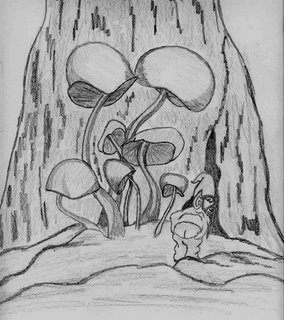





 Keith Jackson is always worth reading and his views on
Keith Jackson is always worth reading and his views on 